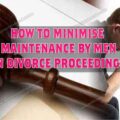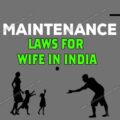
With advent of new form of granting maintenance, Ad-interim,
judicial adventurism went into overdrive with a feminist agenda to keeping the
gender bias alive. Not long ago, usual strategy for a gender biased law
victim/498A victim was to wait for evidence stage and bring evidences in cross
examination of the wife/complainant and fight back. Few years back, I found Tax
Evasion Petition (TEP) as a potent tool to expedite bringing the curtains down on
false cases.
Lately, the judicial officers, especially Mahila
Courts have been stretching the meaning of the preamble ‘An Act to provide for
more effective protection of the rights of women guaranteed under the
Constitution who are victims of violence of any kind occurring within the
family and formatters connected therewith or incidental thereto’ by granting
exparte orders, orders without letting the opposite party/husband to file reply
and if the response is filed, still granting ad-interim maintenance without
even looking into primafacie evidence adduced by the warring couple.
As much as the blame if it is to the growing
pendency of cases, it is also the fault of the responding party i.e. husband.
In my experience, many victims apply the ostrich approach and don’t do anything
till a hefty maintenance is pegged on their back or even when they file their
reply, they purposely hold back evidence.
Thus my reason for writing this article, which
has been used currently in courts successfully. I call this approach
‘Throw the Kitchen Sink’ approach, you may humbly
call it ‘best foot forward’. This approach has been used by victims to thwart
the efforts of unscalporous wives and their lawyers to extract maintenance on
the first few dates itself. The approach is also common sensical as without
initial funding chances of reasonable settlement are higher than once the
opposite party/wife starts to get monthly maintenance.
Maintenance used to granted at the end of case
and interim maintenance was given in exceptional circumstances, with onus on
complainant/plaintiff I.e. wife, to prima facie prove the case and get
maintenance. Lately this became a norm and currently, even before hearing of
interim maintenance and prima facie merits, courts have devised ad-interim maintenance
without hearing the merits of the case also. Ad-interim is not to be confused
with exparte. In exparte, the defendant doesn’t appear in the court and order
is passed against him, but in as-interim, the defendant is present but case is
not heard on merit and ad-interim is granted.
The first step is to keep a lookout for the
summons of maintenance related litigation. There is no benefit of not appearing
in court on hearing date. Not only a person should appear on the date but seek
adherence of guidelines of High court (applicable in Delhi) by seeking income
affidavit as well as supporting documents. Generally, the wife doesn’t provide
supporting documents and this gives you time to file reply and argue on next
date.
The next date is most crucial as you take you
written statement/reply, your income affidavit along with supporting documents
as well prepared well on the lacunae in the income affidavit of the wife. Your
counsel should be well prepared to THROW THE KITCHEN SINK on
this date. If executed well, you will see opposite counsel for the last time
with your wife!
Even the third date is crucial as you have to
ensure pressure and if you got the supporting documents on last date, be
prepared with sharp arguments on falsified information in wife’s income
affidavit. Here CrPC 91 application may be filed for seeking documents not
provided along with income affidavit. Also, seek interim
protection/injunction from the court disallowing wife to enter your
house/workplace.
By this time, mediation could be a good strategy
to settle case on your terms. And if that is not the case, let all the
pleadings finish and before the issues are filed, file a perjury application
for the lies/false information provided by the wife.





